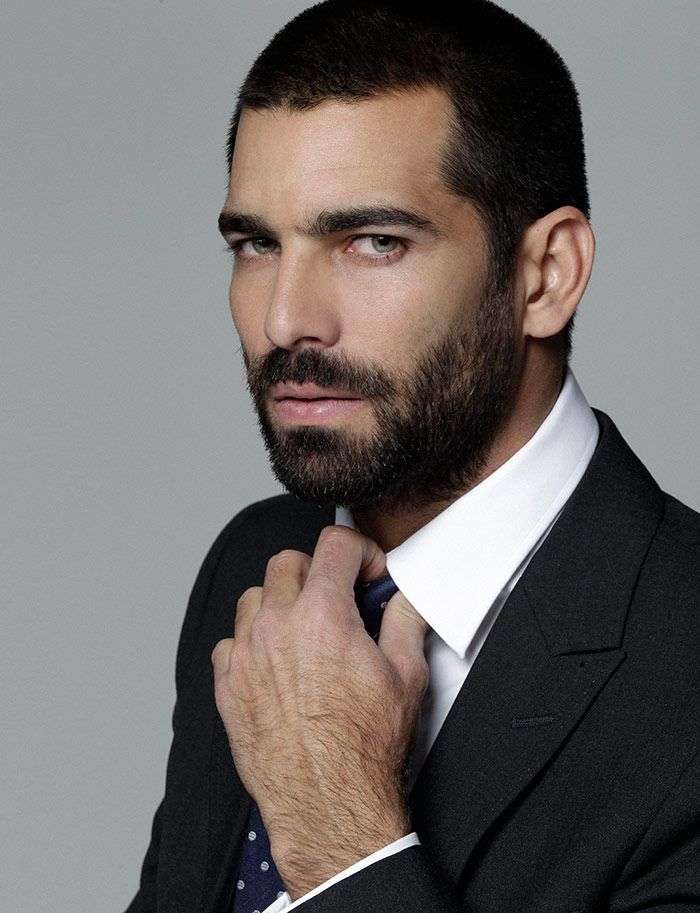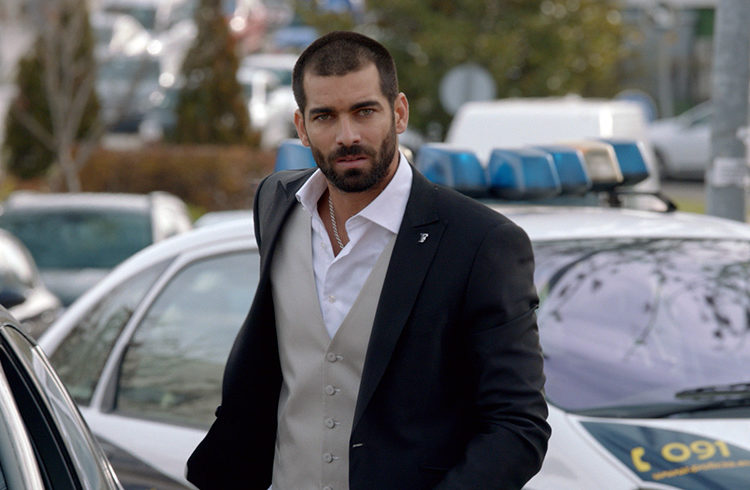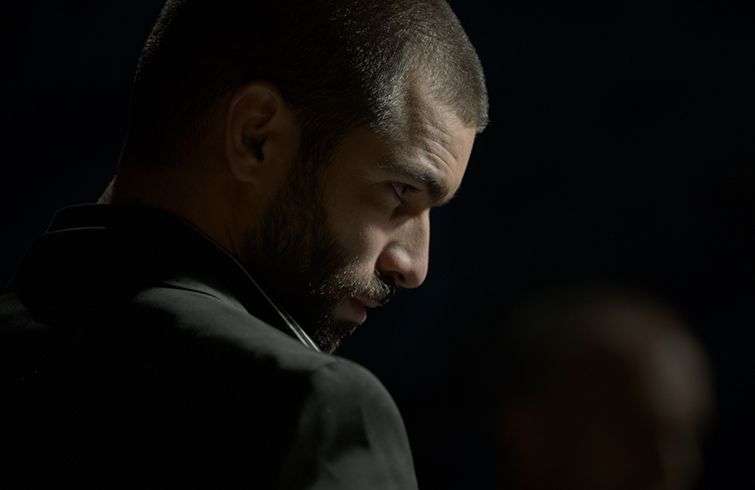Rubén Cortada is one of actors most sought-after by cameras and journalists in Spain, where he has lived and worked for years. This Cuban actor, who has never lost his connection to the island, is one of the lead figures in the successful Spanish series El príncipe (The Prince), playing Faruq Ben Barek, a complex Arab-born character. With his very unique heartthrob’s voice and powerful feline- like gaze, Cortada has conquered the hearts of Spain with his performances and extraordinary physical attraction. Born on Cuba’s Isla de la Juventud, he has been the face of prestigious brands such as Roberto Verino, Jean Paul Gaultier, Guess, Julipet and Custo Barcelona, and has walked up and down the world’s main catwalks (Milán, París and New York). As an actor, his résumé features the television series Bandolera (2011), El tiempo entre costuras (2013) and El príncipe (2014), making him a Spanish TV star. People describe him as shy and reserved, and in fact, he asked us not to talk about his private life, because he believes “that’s the concern of each person and anyone he or she wants to involve, no matter what you do for a living. Privacy is one of the most important things to human beings, and I try to respect the privacy of others.” He describes himself as a curious actor, because he loves to learn and to investigate, and he does not usually give many interviews. He tries to escape from the media frenzy that surrounds him, although he cheerfully responds to all of OnCuba’s questions.
Did you always want to be an actor?
No, at first I wanted to be a tennis player. I didn’t do badly, but at a certain point that road came to an end. Then I wanted to be an engineer, and that aspiration also came to an end.
When did you discover your calling as an actor?
When I was working as a model, I would think of different stories and I wanted to be the photographer. Instead of simple photos, I would put together stories and little by little I began to approach performing. I always liked acting, but I never took the step…until I began devoting myself to it seriously.
Do you think that fashion opened the doors to acting for you?
Fashion gave me a lot of resources, through my contact with different languages and cultures when I traveled. But when I decided to get into acting, it was an obstacle; casting directors and everybody else involved are perfectly right when they believe that you have not spent that time in training, so they don’t give you access to their auditions so as not to waste their time. Perfectly understandable.
Was it hard for you to break free of the stereotype or stigma that accompanies former models when the time came to face the difficult art of acting?
Yes, but work is synonymous with respect, so….that’s it, we just keep working and learning. And one day we’ll see if I can break free of it!
How was your development as an actor influenced by your work in Cuba under the direction of the maestro Humberto Rodríguez, mentor to great Cuban actors?
Humberto, who gave me access to the profession, gave me his approval and subjected me pitilessly to an improvisation test. I remember that I shook; I didn’t know what was waiting for me on the other side of that door. They were all “conspiring” against me; they were subjecting me to the audition that changed my life. From then on he allowed me to enter his world and transmitted much of his knowledge to me. I would have liked to steal more of that wisdom from him. The foundations of my career as an actor will always be his; if he would have sent me to go sell mangos, I would have done that just as well…but luckily, he told me to continue this path.
How complicated has it been for a Cuban to make a name for himself, along with a well-deserved position and respect for his work, on the other side of the Atlantic?
Very complicated. Behind that is an architect named Kaliah; she is my representative. Moreover, there is a lot of work with no time limit or deadline.
Do you think you’ve been pigeonholed into negative characters?
No, I think that it’s very difficult for directors to find actors to play these characters, and there I was. All characters have their polyhedral faces; there are no good or bad ones, you just identify with one or the other.
Which roles do you prefer to play?
The more problems a character has, the richer it is. Because it has a lot of open fronts and it’s harder to place his life in a stable place. You have to think about a lot of things at the same time, and be careful with the type of relationship that you develop with others, and what kind of quicksand you get into to solve all of your conflicts. The more conflicts, the better.
What was the most seductive aspect of Faruq Ben Barek, your most recent character? And what does he have in common with you?
My representative and I liked him from the start. He was offered to us because I had auditioned previously for the film Alacrán enamorado, and I had met the casting director, Rosa Estévez, who later called me for El príncipe. After my representative kept insisting on her seeing me, she agreed to let me audition for that film, and from then on we connected. I didn’t do the movie, but Rosa had me audition for the part of Faruq and fought tooth and nail for me to play that character. I saw Faruq as a challenge, first because I had to get involved in a world that is really distant for us Cubans. It is not our normal day-to-day, even though we hear news about the conflicts of the Middle East, and I, moreover, had looked into that issue because I like history. In Cuba we are not very well informed about the Arab world, as a general rule. Then the challenge was the Spanish accent and the Arabic that the character speaks. I’d never been told before that I physically looked like an Arab, but I fit in when they shaved my head. After that I went to live among them, and I learned a lot. What Faruq and I have in common is that we are both very much family men, and we take care of our own.
You have worked with several speech therapists to perfect your Spanish accent. How do you deal with your Cuban accent when you’re acting?
Yes, I worked with three Spanish speech therapists who taught me a lot. I’m very fond of all three of them, happy to have met them and to have been able to train with them. With respect to my accent, sometimes it gets complicated, especially when the sequence involves aggression. That’s when our form of projecting and expressing ourselves in those situations tends to come out.

Did you find many differences at the level of performance, between Cuba and Spain?
It’s different in each country. Cubans and Spaniards have different life experiences, and therefore they have different backgrounds and perspectives. The studies are universal; the great masters are the same for everyone. Then you might have the good fortune to work with a Humberto Rodríguez or a Fernando Piernas, my Argentine teacher, to ground yourself. But in the end, we’re all human beings and communication is universal, which is why we always understand each other.
What opinion exists in Spain about Cuban acting?
Cuban culture is in a very good place. We are well-respected, because people know that work is done at a high level.
How do you deal with fame, success and the public?
Fame and success are like smoke—they come and go. You’re interesting for a while, and then you disappear, and then you come back. I devote myself to keep studying, and the rest comes on its own. This doesn’t happen with recognition, but with usefulness. The important think about acting is forming part of a story that reflects things that happen in life itself. What can I say about the public? It’s always flattering when you are recognized for your work, although it can be overwhelming when they want to know about your private matters.
Could you tell us about a goal or dream that you have as an actor?
To eventually be free as an actor, for directors to blindly trust in your work and to be able to enjoy acting even more.
Immediate plans?
We are shooting the second season of El príncipe, and there are movie offers… we’ll see how it goes.
Are you happy about being in the next film by Cuban director Ernesto Daranas (Pink Smoke)?
It is very possible that I will participate…. Well, for the moment I’m in, because it’s a project that seems very interesting. First, because it’s being produced by a fellow native of Isla de la Juventud (Harold Sánchez), a professional who is clear about things and very direct. Secondly, because the director is Daranas, who is like a jack of all trades; and thirdly, because I will have the pleasure of working with Héctor Noa, whom I admire. In short, a lot of people whom I really like are involved, so…I’m delighted to be there.











